The MSI GT75 Titan Laptop Review: Hex-Core DTR
by Brett Howse on September 13, 2018 9:00 AM EST- Posted in
- Laptops
- Gaming
- MSI
- Pascal
- Coffee Lake
- Coffee Lake-H
System Performance
Intel’s Coffee Lake is a nice upgrade, offering up to six cores in the 45-Watt H series, compared to four in Kaby Lake. MSI offers either the Core i7-8750H, Core i7-8850H, or the Core i9-8950HK, with the latter installed in the review unit. The Core i9-8950HK offers six cores, 12 threads, and a 2.9-4.8 GHz operating window at stock speeds. There’s 12 MB of cache, and of course the 45-Watt TDP.
The review unit also comes with 2 x 16 GB DDR4-2667, and there’s two more SODIMM slots if you need more memory than that. The base models come with just a single 16 GB stick, so while you do lose out on the dual-channel memory, it’s nice that if you do want to upgrade to 32 GB of memory, you don’t need to buy two sticks of memory.
To test system performance, the GT75 Titan was run through our standard laptop tests. Comparisons are against similar systems and a few others, but if you want to compare it to any laptop we’ve tested, you can use our online Bench.
PCMark
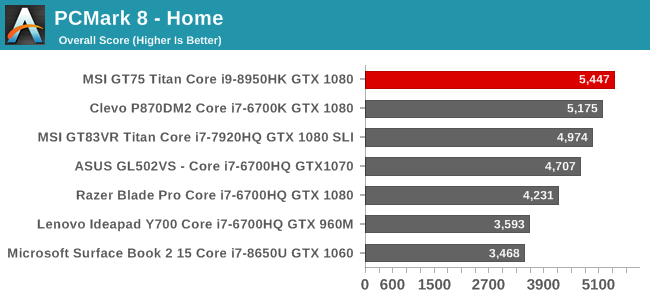
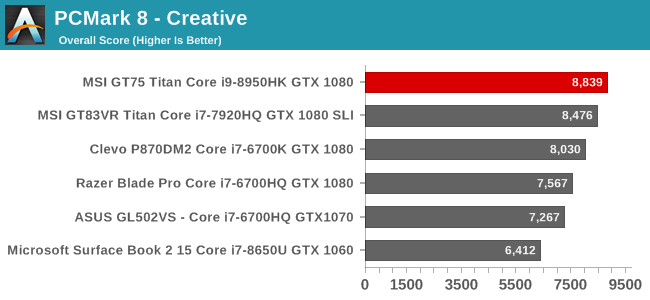
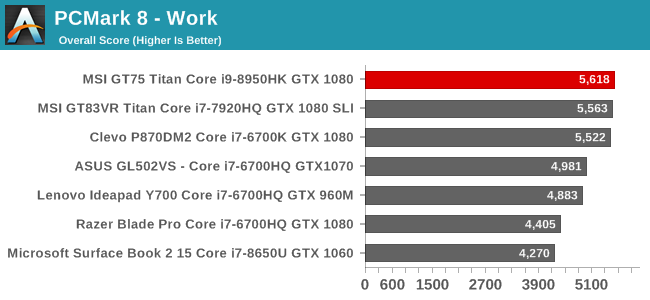




PCMark tests all aspects of a system, including the CPU, GPU, and storage. The extra cores in the GT75 Titan help propel it to the tops of these tests, even compared to the Clevo P870DM2 with it’s desktop class Core i7-6700K CPU.
Cinebench
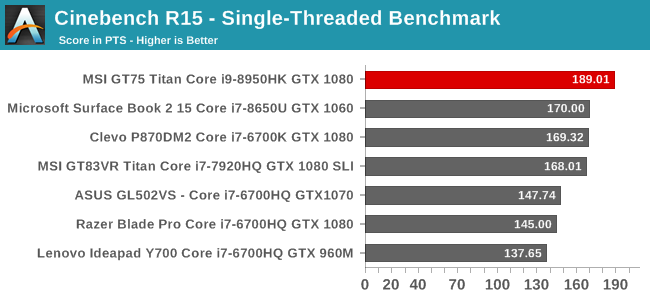
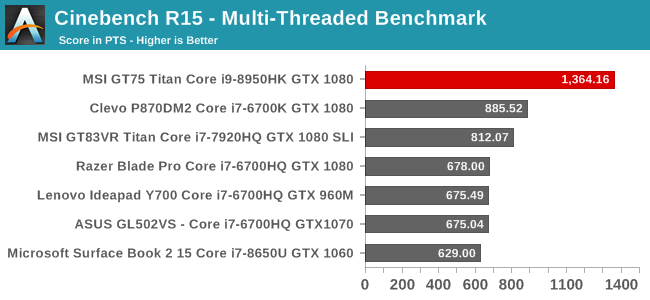
Cinebench is a pure CPU test, and with both single-threaded and multi-threaded tests, we can take a look at both the single-core performance as well as when all six cores and twelve threads are in use. With a maximum turbo frequency of 4.8 GHz, the Core i9-8950HK pulls out a nice lead on the single-threaded result, and the extra cores absolutely demolish the quad-cores in previous laptops.
x264
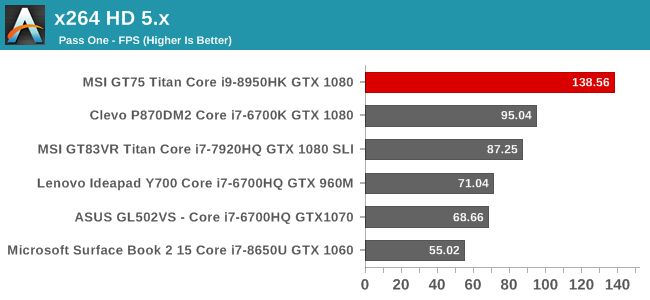
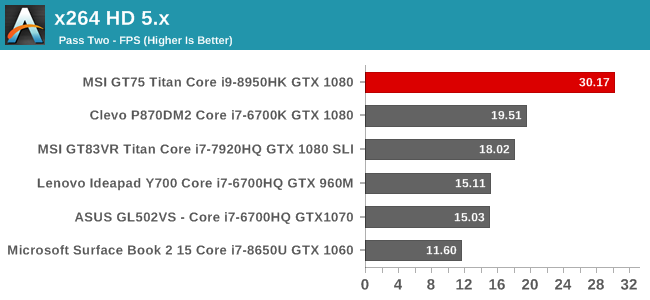
Another CPU test, x264 does a video conversion over two passes. The workload is quite long, and on Ultrabooks it can bump into the thermal limits of a device, but on these desktop replacement systems that’s not an issue. The MSI GT75 Titan once again flexes its extra two cores here and wipes the floor against even the fastest quad-core models we’ve tested.
Web Tests
All of our web tests are done with the latest version of Microsoft Edge, and unlike our other tests, web performance is often dictated by the browser. Over time, browsers tend to get faster at certain tasks, so even the same device may show different results later in its life.
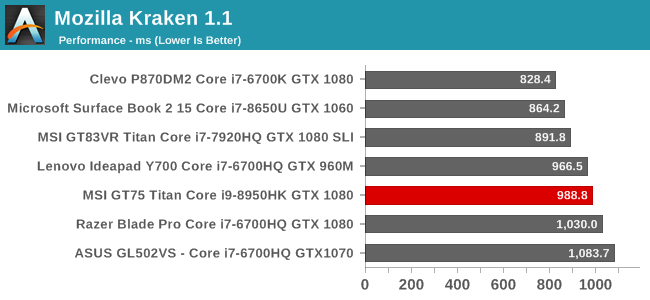
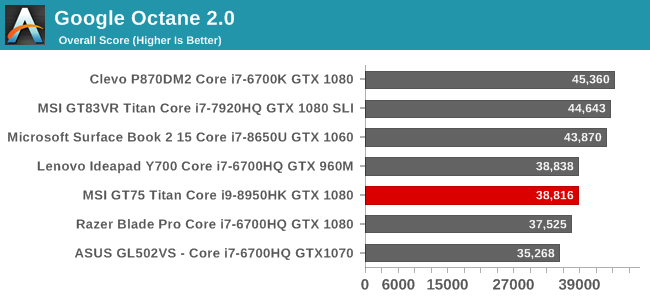
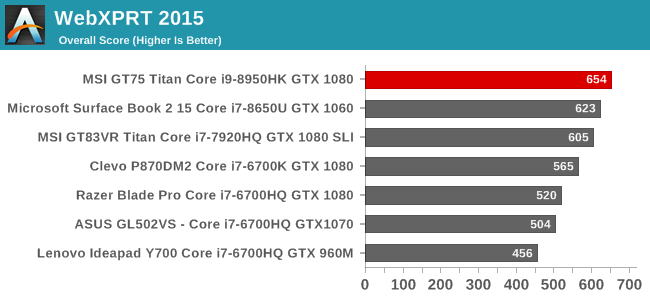
Interestingly, the Kraken 1.1 and Octane results are a bit lower for this laptop compared to some of the previous generation devices we’ve tested. However the WebXPRT results do show an improvement. At the end of the day, laptops with H series CPUs tend to not struggle with web workloads regardless.
Storage Performance
You can get the GT75 Titan with just a 1 TB 7200 rpm drive, or MSI offers models with 256 and 512 GB SATA SSDs, and models with either a single 512 GB NVMe, or two 512 GB NVMe in RAID. There’s three total M.2 slots, so after purchase, there’s room to upgrade as well. It’s nice that all models come with the 1 TB spinning drive though, since the install size for games these days can be well over 100 GB per game.
As enthusiasts, it can be a bit disheartening that SSDs have become commodities for laptop manufacturers, but that is certainly the case. The review unit we received from MSI ships with the Samsung PM981 512 GB SSD. This 64-layer TLC drive is one of the best performing TLC drives around, and if you want to read more about it please check out our review.
The Samsung PM981 is perhaps not quite as fast as their Pro series with MLC NAND, but for most people, the speed difference is mostly academic. The PM981 can saturate a PCI 3.0 x4 link on reads, and still does awfully well on writes.
SSDs in laptops is a bit of a lottery, but this GT75 Titan has a great SSD. They offer this in RAID 0 as well for 1 TB total, which is going to perform marginally better, but likely not enough for anyone to really notice except on synthetic tests.


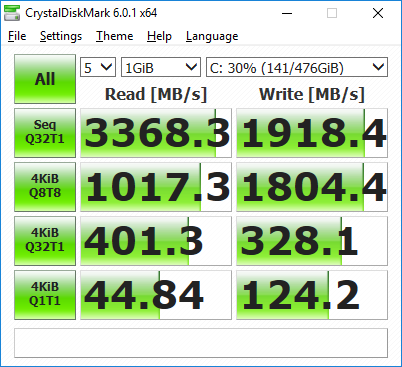








48 Comments
View All Comments
ViRGE - Thursday, September 13, 2018 - link
Later on in the article, they mention that it's the new adapter based on Intel 9260, rather than the awful Qualcomm stuff. That may make it worth it. The worst part of Killer's stuff in recent years wasn't the software, it was the underlying hardware.Brett Howse - Thursday, September 13, 2018 - link
Yes the 1550 didn't exhibit any of the issues I've seen with the older model. I was pretty happy with it.PeachNCream - Friday, September 14, 2018 - link
In a roundabout way, this validates a number of complaints about earlier models of Killer Wireless products that were the subject of ire in previous articles. It's a shame that sort of acknowledgement wasn't around when previous generations were actually being sold. Also, this is the first time I've seen a Killer Wireless even get a bandwidth test in a while. Recent motherboards equipped with earlier model Killer WiFi cards didn't get any testing. I'm not trying to connect and conspiracy dots here, but the combination of facts doesn't paint a very rosy picture about the past couple years of Anandtech's view of Killer products and might add fuel to the fire of people like timecop1818 to continue to denounce Rivet Networks' claims as suspicious.Brett Howse - Friday, September 14, 2018 - link
You're mistaken I've reviewed plenty of laptops with Killer's previous model and every single time I said they had reliability issues. I think I've been pretty clear over the last couple of years that at this point there's Intel and no one else in terms of quality Wi-Fi. In fact I recently reviewed a laptop with the Qualcomm Wi-Fi that the Killer was based on and it had the exact same issues.PeachNCream - Friday, September 14, 2018 - link
That wasn't a call out of you in specific, but the tone of the site as a whole. In fact, I agree that you've noted stability problems and recommended driver updates in reviews of the Dell XPS 15 9560, the MSI GT83VR Titan 7RF, and Clevo P870DM2, and had a relatively slow result with a Razer Blade Stealth in March of 2016. (I didn't remember so I just checked and apologize for leaving you with the impression that I was slinging ire your way.)The lack of bandwidth testing is more a comment about motherboard reviews where there isn't much in the way of validation done with NIC performance, but there were some comments espousing the benefits of its presence. There have also been past product announcements that were promotional in nature. All of that was in the absence of analytical testing that proved the benefit of the Killer NIC's traffic prioritization, its key selling point. Mix that situation with the lingering ire Bigfoot/Rivet/whomever else has built over the years with customers and you've got a situation where people will get defensive or aggressive over being told they should find the product useful. None of that is something I think you've had a hand in. The problem is, or maybe was given the transition to Intel hardware and that the point is probably now moot, elsewhere.
pyrrh0 - Thursday, September 20, 2018 - link
I work with Wi-Fi and Apple's choice of Broadcom's kit in its laptops trumps anything I've used or heard about using Intel's WLAN gear.bennyg - Friday, September 14, 2018 - link
Eh, I had an issue a few years ago that was easily fixed by uninstalling the silly management software, killer wlan issues are overblown imoRedNeon - Friday, September 14, 2018 - link
Except that there already is a laptop with AMD Vega 56 GPU, the Acer Predator Helios 500.RedNeon - Friday, September 14, 2018 - link
Anandtech used to be good.Brett Howse - Friday, September 14, 2018 - link
Those were the days!